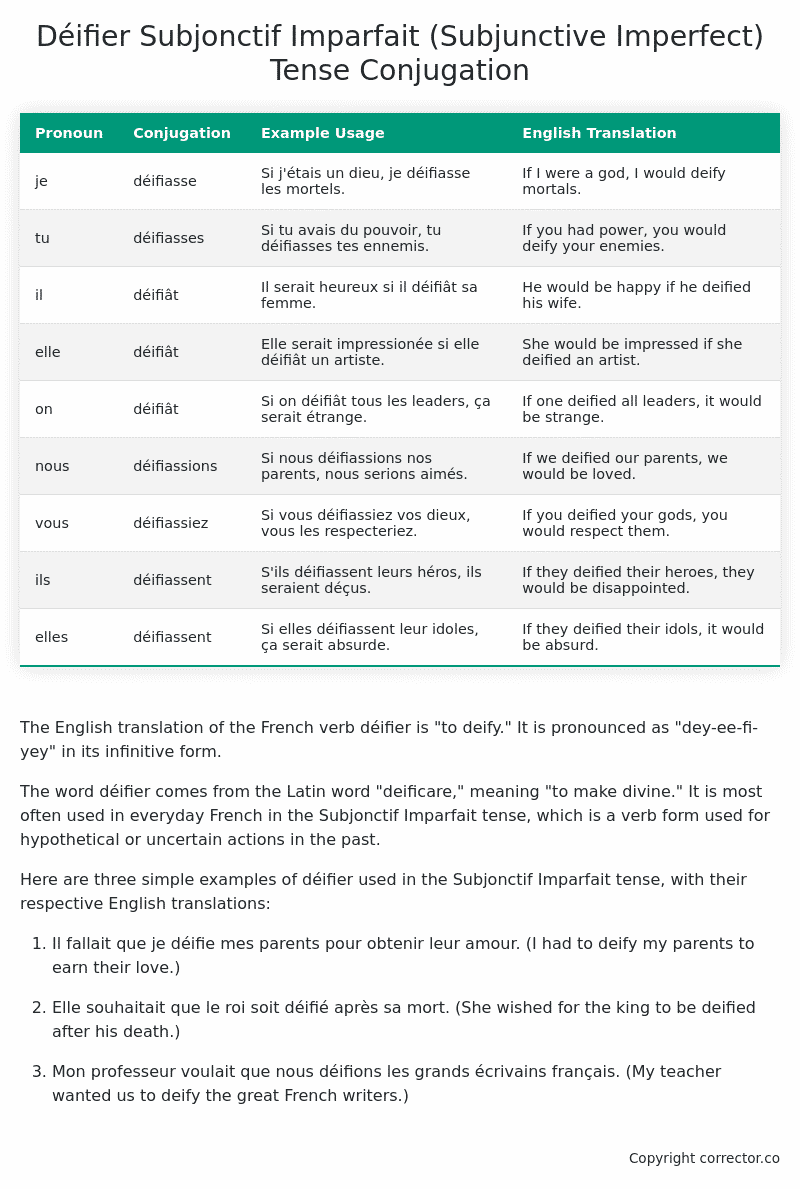Subjonctif Imparfait (Subjunctive Imperfect) Tense Conjugation of the French Verb déifier
Introduction to the verb déifier
The English translation of the French verb déifier is “to deify.” It is pronounced as “dey-ee-fi-yey” in its infinitive form.
The word déifier comes from the Latin word “deificare,” meaning “to make divine.” It is most often used in everyday French in the Subjonctif Imparfait tense, which is a verb form used for hypothetical or uncertain actions in the past.
Here are three simple examples of déifier used in the Subjonctif Imparfait tense, with their respective English translations:
-
Il fallait que je déifie mes parents pour obtenir leur amour. (I had to deify my parents to earn their love.)
-
Elle souhaitait que le roi soit déifié après sa mort. (She wished for the king to be deified after his death.)
-
Mon professeur voulait que nous déifions les grands écrivains français. (My teacher wanted us to deify the great French writers.)
Table of the Subjonctif Imparfait (Subjunctive Imperfect) Tense Conjugation of déifier
| Pronoun | Conjugation | Example Usage | English Translation |
|---|---|---|---|
| je | déifiasse | Si j’étais un dieu, je déifiasse les mortels. | If I were a god, I would deify mortals. |
| tu | déifiasses | Si tu avais du pouvoir, tu déifiasses tes ennemis. | If you had power, you would deify your enemies. |
| il | déifiât | Il serait heureux si il déifiât sa femme. | He would be happy if he deified his wife. |
| elle | déifiât | Elle serait impressionée si elle déifiât un artiste. | She would be impressed if she deified an artist. |
| on | déifiât | Si on déifiât tous les leaders, ça serait étrange. | If one deified all leaders, it would be strange. |
| nous | déifiassions | Si nous déifiassions nos parents, nous serions aimés. | If we deified our parents, we would be loved. |
| vous | déifiassiez | Si vous déifiassiez vos dieux, vous les respecteriez. | If you deified your gods, you would respect them. |
| ils | déifiassent | S’ils déifiassent leurs héros, ils seraient déçus. | If they deified their heroes, they would be disappointed. |
| elles | déifiassent | Si elles déifiassent leur idoles, ça serait absurde. | If they deified their idols, it would be absurd. |
Other Conjugations for Déifier.
Le Present (Present Tense) Conjugation of the French Verb déifier
Imparfait (Imperfect) Tense Conjugation of the French Verb déifier
Passé Simple (Simple Past) Tense Conjugation of the French Verb déifier
Passé Composé (Present Perfect) Tense Conjugation of the French Verb déifier
Futur Simple (Simple Future) Tense Conjugation of the French Verb déifier
Futur Proche (Near Future) Tense Conjugation of the French Verb déifier
Plus-que-parfait (Pluperfect) Tense Conjugation of the French Verb déifier
Passé Antérieur (Past Anterior) Tense Conjugation of the French Verb déifier
Futur Antérieur (Future Anterior) Tense Conjugation of the French Verb déifier
Subjonctif Présent (Subjunctive Present) Tense Conjugation of the French Verb déifier
Subjonctif Passé (Subjunctive Past) Tense Conjugation of the French Verb déifier
Subjonctif Imparfait (Subjunctive Imperfect) Tense Conjugation of the French Verb déifier (this article)
Subjonctif Plus-que-parfait (Subjunctive Pluperfect) Tense Conjugation of the French Verb déifier
Conditionnel Présent (Conditional Present) Tense Conjugation of the French Verb déifier
Conditionnel Passé (Conditional Past) Tense Conjugation of the French Verb déifier
L’impératif Présent (Imperative Present) Tense Conjugation of the French Verb déifier
L’infinitif Présent (Infinitive Present) Tense Conjugation of the French Verb déifier
Struggling with French verbs or the language in general? Why not use our free French Grammar Checker – no registration required!
Get a FREE Download Study Sheet of this Conjugation 🔥
Simply right click the image below, click “save image” and get your free reference for the déifier Subjonctif Imparfait tense conjugation!

Déifier – About the French Subjonctif Imparfait (Subjunctive Imperfect) Tense
Formation
Common Everyday Usage Patterns
Interactions with Other Tenses
Subjonctif Présent
Indicatif Passé Composé
Conditional
Conditional Perfect
Summary
I hope you enjoyed this article on the verb déifier. Still in a learning mood? Check out another TOTALLY random French verb conjugation!


